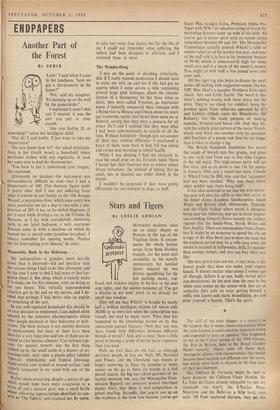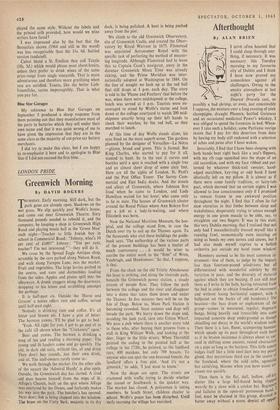Stars and Tigers
By LESLIE ADRIAN MOTORING Madness takes on as many shapes as Proteus at the top of his Virgilian form. It encom- passes the whole human range, from Bank Holiday tragedy, for the most part
farces enacted by two drivers squabbling for the unnecessary but familiar last parking meter, red- faced and reckless rivalry to be first at the next stop lights, and the solemn nonsense of 'I've got a whatsit in my tank' stuck to an already too small rear window.
They tell me that Which? is bought by nearly half a million intelligent citizens (of whom only 30,000 or so were lost when the subscription was raised), but read by many more. What then has happened to the knowledge passed on by that omniscient journal (January 1964) that 'our tests have found little difference between different brands of petrol'? And, just as vital, 'there is little point in buying a grade of petrol more expensive than you need.', Well, no fool likes an old fuel. ;o although get-away people in fact use Shell, BP,.National and Power, and the Cleveland sign means as happy motoring as Esso, by keeping as many names on the go as there arc pumps at a tied petrol station, the big two (three-quarters of the market between 'em, says the Monopolies Com- mission Report) can preserve several cherished myths. First, that there is real competition in petrol retailing. Secondly, that you're one up on the madman in the slow lane because you've got Super Plus, Golden Extra, Premium Alpha Plus Super with WM 7 or whatever string of words the marketing director came up with in his bath. All you've got is motor spirit with an octane rating somewhere between 89 and 101. The Monopolies Commission actually printed Whichi's table of octane values as on the market last year, and most of the stuff sold is in fact in the 'premium' bracket of 96-98, which is unnecessarily high for many small cars and is a waste of the owner's money. You might as well stuff a few pound notes into your tank.
All this tiger rag also helps to drown the small noises off making with suggestive sounds like Jet, VIP, Mex (that's a naughty Northern Irish one), Ascot, Ace and Little David. The word is that there's nothing wrong with these juices but the price. They're too cheap for comfort, being by- product spirit from refineries operated by ICI and Lobitos (which owns the Manchester Oil Refinery) for the main purpose of making naphtha, bitumen and heavy oils. And they dis- turb the orderly price pattern of the major brands, which vary from one another only, by unnotice- able fractions of a penny and then for nO longer than it takes to change a tag.
The British Standards Institution has sorted the tangle of brands into five grades, and plans to star each fuel from one to five (like Cognac in the old days). The high-octane spirit will get five stars, and so on down to one. On the pumps in January 1966, said a report last week. I doubt • it. When I rang the BSI, they said that 'agreement had not been reached.' Why stop those extra, super golden eggs from being laid?
It has also occurred to me that the wise motor- ing man will plan his refills so that they occur in the Inner Areas (London, Southampton, South Wales and Bristol, Hun, Merseyside, Tyneside and the Clyde Valley) where petrol is cheapest, being near the refineries, and not in those innocu- ous-sounding General Zones (mostly the holiday regions like the South-West, North Wales and East Anglia). There are intermediate Outer Zones, too. It might be an economy to spend the 13s. on a copy of the Blue Book just to have the map, but the payback period may be a trifle long when the return is counted in halfpennies. Still, it's quicker than savings stamps, and you can buy what you like.
The best petrol you can use, it says here, is the lowest grade that does not make your engine knock. It doesn't matter what pump it comes out of (though, believe it or not, badly stored spirit can deteriorate). So the next time the man in the white coat comes on the screen with that air of authority (he's only an actor getting himself a refill, you know) and starts brandishing, go and pour yourself a Scotch. That's the spirit.
The skill of the wine shipper is a mystery to the layman, but it seems almost miraculous when the same layman is confronted by immature wines and expected to pass an opinion. This happened to me at the Calvet tasting of the 1964 vintage, the first in Britain, held in the Royal Garden Hotel , recently. There were all those dark 'bourgeois' clarets, with characteristics that would become More-marked and different over the years, but which were hard to discern in the first year of their development.
The Château St. Germain might be said to have promise, the Château Vieux Moulin, the La Tour du Cauze already enjoyable (or are my standards too low?), the L'Enclos Haul- Mazeyres and the Bellerive a little hard, even acid. All from scattered districts, they yet dis•
played the same style.. Without the labels and the printed crib provided, how would we wine writers have fared?
I was impressed also by the fact that the Beaujolais shown (1964 and still in the wood) was less recognisable than the 1 ls. 6d. bottled version (undated).
Calvet blend a St. Emilion they call Tauzia (18s. 3d.) which would please most claret-lovers, unless they prefer to drink wines of the same price-range from single vineyards. That is more adventurous and therefore more gratifying when you are satisfied. Tauzia, like the better Lieb- fraumilchs, varies imperceptibly. That is what you pay for.
Blue Star Garages My reference to Blue Star Garages on September 3 produced a sharp response from them pointing out that they manufacture most of the parts in batteries which they sell under their own name and that it was quite wrong of me to have given the impression that they are in the same class as the majority of cut-price car battery merchants.
I did try to make this clear, but I am happy to re-emphasise it here and to apologise to Blue Star if I did not succeed the first time.







































 Previous page
Previous page